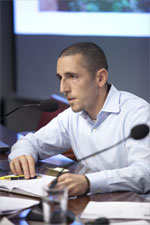Coffee and Contraception: Combining Agribusiness and Community Health Projects in Rwanda
Population, health, and environment expert Irene Kitzantides discusses her time in Rwanda as a USAID Global Health Fellow. She emphasizes the importance of community-based approaches; the advantages of integrating cross-cutting activities at the outset; and the need for strong monitoring and evaluation systems to measure outcomes.
Overview
"Population pressures and diminishing land holdings--due to high fertility rates, war and genocide, and subsequent migration--have caused a rapid decrease in the forested and protected areas and increased soil infertility and food insecurity" in Rwanda, USAID's Irene Kitzantides told a Wilson Center audience.
Kitzantides, a population, health, and environment advisor and global health fellow, said "the population is projected to reach over 14 million by 2025"--nearly one-third more than today, due to the country's high fertility rate of nearly 5.5 children per women–which could continue to negatively impact forests and food supplies.
In response to these challenges, USAID supported the Sustaining Partnerships to Enhance Rural Enterprise and Agribusiness Development (SPREAD) Project. SPREAD uses an integrated population-health-environment (PHE) approach to develop the coffee agribusiness and bring family planning, HIV/AIDS, and reproductive health services to coffee workers.
Combining income generation with health services was thought an effective way to "fulfill the overall SPREAD goal of improving lives and livelihoods," said Kitzantides.
A SPREADing Mandate: Integrating Health and Agribusiness
SPREAD follows USAID's PEARL I and II Projects, which focused exclusively on agricultural development. Coffee is still at the center of SPREAD's activities, with $5 million of the project's $6 million USAID budget earmarked for agricultural development.
However, a broader mandate to include health services emerged after recognition that greater income alone does not ensure greater quality of life. The additional health funding leverages SPREAD's already established relationships with farming cooperatives to bring health services to traditionally underserved rural communities.
"We really tried to build on the existing assets of the cooperative," said Kitzantides. "We also really tried to complement local and national public health policy and partners."
The integration of health with agricultural goals, and the use of already established in-country health programs, has made SPREAD extremely cost-effective, with HIV/AIDS prevention education costing less than $2 per person.
Examples of SPREAD's integrated work include:
- Combined health and agricultural lessons: Kitzantides and her colleagues trained nearly 400 animateurs de café, cooperative employees running the agricultural education programs, to incorporate public health objectives into their activities. Combining health and agricultural education into one session takes advantage of workers already trained during previous USAID programs. The combination also attracts more male participants, who traditionally shunned HIV/AIDS, family planning, and reproductive health campaigns and services.
- Radio programming: SPREAD worked with the agricultural radio program Imbere Heza ("Bright Future") to incorporate health messaging at the end of each program.
- Mobile clinics: SPREAD works with cooperatives and local health centers to bring convenient services to farmers when they gather at sales or processing stations during harvests.
- Community theater: SPREAD hires local theater groups to perform skits on health. The farming communities "really love community theater and always ask for it," said Kitzantides.
SPREADing Success
In its relatively short existence, SPREAD's health activities have reached over 120,000 people with HIV/AIDS prevention messages; nearly 90,000 with messages discussing family planning/reproductive health; and almost 40,000 about maternal and child health. The project counts 347 women as new users of family planning services.
Lessons learned--which will be examined in more detail in an upcoming issue of Focus--include the importance of using community-based approaches to overcome perceived social barriers; the advantages of integrating cross-cutting activities at the outset of a program; and the need for strong monitoring and evaluation systems to measure the effort's outcomes.
 Jason Bremner of the Population Research Bureau said PHE projects such as SPREAD go "beyond what the health sector itself can do and find new ways of reaching underserved remote populations." He presented a soon-to-be-released PRB map plotting the location of more than 40 PHE projects in Africa.
Jason Bremner of the Population Research Bureau said PHE projects such as SPREAD go "beyond what the health sector itself can do and find new ways of reaching underserved remote populations." He presented a soon-to-be-released PRB map plotting the location of more than 40 PHE projects in Africa.
The success of SPREAD and similar projects demonstrates the potential for PHE approaches to bring reproductive health and family planning services to rural areas, Bremner noted, but there is still much work to be done to scale up this integrated approach--and to document its successes.
Sustaining SPREAD
Kitzantides said it took several years to integrate health activities with the already established agricultural programs. Since USAID funding for the program is scheduled to end in 2011, she is uncertain that the time remaining will be enough for SPREAD's health partners to develop the logistical and financial capacities to become self-sustaining. But SPREAD has changed attitudes and beliefs, two key objectives that do not require sustained funding.
"We used to talk about growing coffee, making money, buying material things like bikes--not about problems like malaria, HIV/AIDS, etc.," said one SPREAD agricultural business manager during the program's evaluation. "Someone could have 5 million Rwandan francs in the house but could suffer from malaria where medicine costs 500 Rwandan francs, due to ignorance. You have to teach people about production, you have to also think of their health to improve their lives."
Drafted by Dan Asin and edited by Meaghan Parker.
Documents & Downloads
Speakers
Hosted By

Environmental Change and Security Program
The Environmental Change and Security Program (ECSP) explores the connections between environmental change, health, and population dynamics and their links to conflict, human insecurity, and foreign policy. Read more

Africa Program
The Africa Program works to address the most critical issues facing Africa and US-Africa relations, build mutually beneficial US-Africa relations, and enhance knowledge and understanding about Africa in the United States. The Program achieves its mission through in-depth research and analyses, public discussion, working groups, and briefings that bring together policymakers, practitioners, and subject matter experts to analyze and offer practical options for tackling key challenges in Africa and in US-Africa relations. Read more
Thank you for your interest in this event. Please send any feedback or questions to our Events staff.








